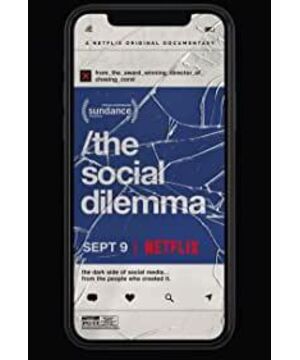"The social dilemma" (Chinese translation "Social Trap") quoted a news report saying that Tristan is considered a barely conscientious person in Silicon Valley. This documentary takes one of his projects as the main line, and talks about the erosion of individual humans and the entire human civilization by the booming social software in the last ten years. These social media companies (FB, twitter, wa, insta, etc., should you thank God, most of them cannot be opened in China^_^) only one purpose is to make money and make the most money. In a free market and a fair competition environment, the last word for development is to make more money. Under this single baton, these large companies in Silicon Valley have used human psychological weaknesses to grab the maximum amount of attention and time from individuals, packaged and sold to advertisers for profit, and at the same time, even their own Unexpectedly, it would push human society to the black and white poles invisibly. The first half focuses on the impact of analysis algorithms (artificial intelligence + big data) and business strategies on an individual. The second half talks about the impact on the overall human civilization: the democratic system, the relationship between people, and the communication between people.
The first is the human individual part.
One of the Silicon Valley investors said that in the last generation, Silicon Valley mainly produced hardware and tool software, such as Apple computers, photoshop and so on. They make money by selling tools to you. In this generation, the main income depends on advertising. Are there products? Yes, this product is the user, and everyone—your time, attention, and any privacy—is packaged and sold to advertisers. The feature of the tool is that the tool will stay patiently, wait for you to use it, and then turn it off when you are done using it. After you use Photoshop, you won't go to read every ps menu and enjoy it. The characteristic of current Internet products (social apps) is that they keep tempting you to use it, keep grabbing your attention, your time---in short, they make you addicted, and other things like tobacco, alcohol, drugs, etc. The same as addictives. The result is the same-after a short period of happiness, you will feel exhausted, empty and depressed.
Here is a quote from the chief technical and commercial promotion leaders of several former major manufacturers to deeply analyze the original intentions of these products. As Tristan said: There are 20 or 30 people involved in the design of an email app, and everyone is arguing about fonts, colors, etc. No one has ever thought about the ethics of it as a product--that is, whether it will be addictive. The product managers of Twitter and FB bluntly stated that the theoretical basis of the design logic behind them is the addiction theory in psychology-it is addictive and keeps going. Trend (equivalent to the hot list in Weibo), topic recommendations, are tailored for you, and the purpose is to keep you and keep reading.
There is a point worth arguing here. These big companies can defend themselves: I don’t have the ability to control myself. Just like smoking, your willingness to smoke to death is not my original intention of selling cigarettes. The product manager of FB said that at the beginning we invented the like button mainly to spread positive energy, but we really didn't expect some people to get depression because they got more likes than others. In fact, this controversy is exactly what Tristan and this documentary want to promote: legislation. Various countries have different regulations on smoking bans, smoking age, occasions and other legislations that actively intervene. There is also the passive control of tax increases. Social networks also urgently need corresponding legislation. I remember a person from FB said, I think I have made so much money, and I shouldn’t resign if I still do something like this--he can resign, but the company must move forward, and others will fill him. The position continues to do such shameful things.
In my personal experience, I remember that when the Internet was first introduced, in the web 1.0 era, I already felt the influence of the Internet on time and attention. Everyone is familiar with this kind of scene. The browser was originally opened to check a problem. After the last half an hour has passed, you have forgotten why you opened the browser in the first place . So for many years I have maintained a habit: to go to any website is to directly enter the URL. The interface provided by google is also simple enough, just want you to concentrate on searching for what you want, and don't be disturbed by anything. Open Baidu and see that the homepage is already a lot of interference.
Compared with today, there is no artificial intelligence in the web 1.0 era. It is still a human-dominated Internet. Web pages still reflect the will of editors. It is impossible to accurately guess your likes and dislikes, and there is no way to subtly set the agenda to change your thoughts and shape you. The worst result of your last lingering on the Internet is just reading some information in a disorganized manner. At most, a little time is wasted and there is no other harm.
And now in this algorithm-dominated world, you will find that you not only waste time, but sell your time and attention to advertisers. I was also imperceptibly turned into a fool by artificial intelligence-this change is very shocking, but it is true. It’s not that hard to turn people into stupefies—this film cited the example of "Di Ping Said", the example of the pizza door. In fact, people believe in all kinds of conspiracy theories. As long as you can systematically and long-term contact the same type of information, you will eventually be brainwashed into a fool. You can do it without persecution, without any power and money control.
The second half mainly talks about the impact on society-society is made up of individuals, and the impact on individuals will inevitably affect society. The expansion of this part is a bit weak, but the conclusion is okay. AI led to news farms, and fake news spread faster. Conspiracy theories are prevailing, and human expressions are increasingly resorting to emotions, moving towards the extremes of black and white. Commercial behaviors use these characteristics to sell goods, and politicians use this to canvass votes. This is a more extreme world of competition. The voice of a little bit of sex and a little bit of rationality has been almost destroyed. Regarding the "pizza door" incident in the conspiracy theory film, it is a very classic conspiracy theory: pointing to high-level government (so it’s absolutely confidential, you can’t see it from normal media channels), information disclosed by internal employees (I’m from the pizza shop) XX, this is true, I have seen it with my own eyes, but I dare not say, I will lose my job if I say it, etc.). The result of the spread of this conspiracy theory is to muddy the water and greatly weaken the spread of normal news. The popularity of this kind of gadget is mainly due to the "immediate" nature of social media, and the opposition between black and white is also due to timeliness-on social media with a few brushes a day and a few words (140 words), people have lost To delve into a problem, one's patience. Appealing to emotions is the most convenient. The fact that the forum was built over hundreds of stories is unlikely to exist anymore.
In the era of web 2.0, blog, and bbs, you can click on a person’s ID, you can list all his posts, and reply, you can quickly get a general understanding of the person (at least in a small range, more comprehensive ), now it’s good to be able to flip through his last few 140 words in this era. This kind of "living in the present" is designed for consumerism, and it is harmful to one person to understand one thing . Previous online debates have the most basic consensus foundations: legal framework and logical deduction framework. The arguments under these two frameworks must be based on facts. Therefore, it is indeed possible to "the truth becomes clearer and clearer". In the current debate, such a framework does not exist, because it is impossible to complete a full discussion and a complete logical reasoning process within 140 words. No one cares about what the facts are-it takes time to figure out the time, place, person, and event, and it requires brainstorming. This is what social media doesn't want users to do the most. Once you learn to think logically, you will become sensible, and you will not be so impulsive. How can I sell (deceive) goods (you)?
A simple example that is still happening now is Sichuan fans and anti-chuan people. Both sides feel that the other party is stupid (and they are absolutely correct). This is one of the results of big data and AI operations. The so-called Russian hacker election actually refers to It is these means.
From the perspective of the advertising industry, I have never seen such precision: the results of your investment are presented immediately, even controllable. In the past, to evaluate the effectiveness of a media advertisement, it was necessary to use a survey company to conduct a sample survey, put it into a data model and calculate and analyze it. It was barely possible to draw a conclusion that may not be counted in everyone's mind: whether the advertisement was voted correctly or was voted badly. After all, in that era, people were still living in a real society, and there were too many elements that affected sales. And now? Almost everyone lives in their own circle of friends, on their own social networks, the whole society is already an illusion, and just a few lines of code are enough to control the illusion. Like the plot in The Matrix, do you want to meet a girl in a red dress? It can be achieved by changing a few lines of code-this is no longer Tian Fang Ye Tan and sci-fi movies, as long as you get her geographic location and push it to you, you can "encounter". This kind of omnipotent control is very scary.
After all, human beings have a good habit of reflection. This documentary can be regarded as the prelude to reflection. The next corresponding privacy protection legislation and data use legislation may be difficult to advance. When the television media first entered thousands of households, Bozeman wrote "Entertainment To Death" to be wary of the impact of television as a mass media on society. Compared with the negative effects of the television era, today’s active manipulation of people’s online social media goes a step further. Many people sneered at Bozeman's criticism-TV didn't do us anything. Yes, TV didn't treat humans like anything, so I changed it to a more ruthless way.
For individuals, living in this era when social networks dominate everything, you must first have the ability to control yourself, always remember that you are using tools, not tools enslaving you. Use it when you need it, and put it down when you use it up. Superficial happiness has a price. Television and the Internet will not make you happier, nor will it turn you into a more complete person and make your life more meaningful. In many cases, everyone is just one of the insignificant noises of this era. Instead of drawing a prison and living in social media, it is better to leave the Internet, read more, think about and write more than one hundred and four crosses. Growth is painful, but the joy of growth is also solid.
Secondly, cherish life and stay away from the Internet, and make more "real" friends (whether this friend comes from the Internet or from life). A real friend needs time to communicate with each other. A real friend is worth a thousand points. Great acquaintance.
View more about The Social Dilemma reviews











